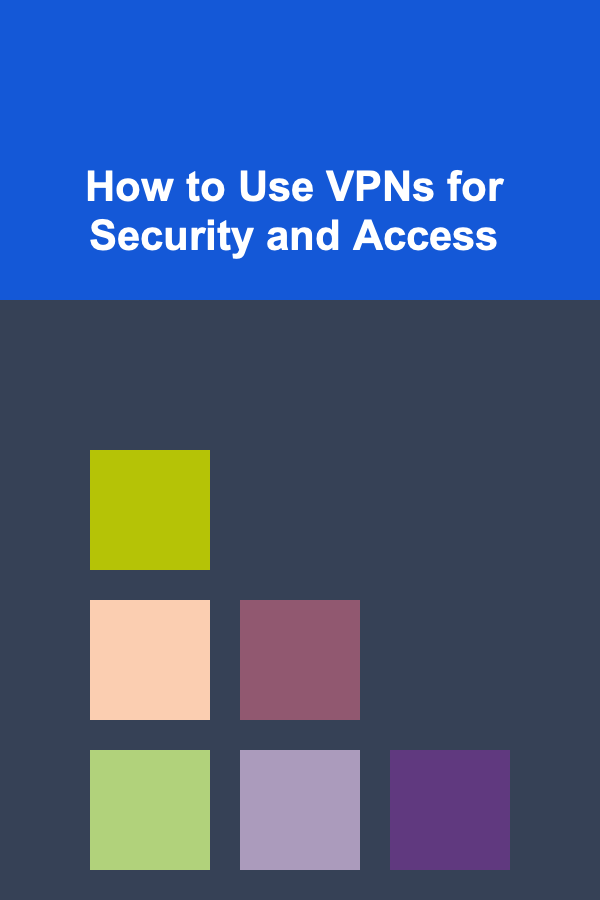
How to Use VPNs for Security and Access
ebook include PDF & Audio bundle (Micro Guide)
$12.99$7.99
Limited Time Offer! Order within the next:

Virtual Private Networks (VPNs) have become a vital tool for internet users who want to ensure their privacy and security. In an era where data breaches, cyberattacks, and surveillance are prevalent, VPNs offer a straightforward way to protect sensitive information and maintain online anonymity. Whether you're an individual concerned about your personal data, a business looking to secure remote communication, or a traveler trying to access region-restricted content, understanding how to use a VPN for security and access is crucial.
This article will explore the role of VPNs in online security, how they function, why you need them, and best practices for their effective use.
What is a VPN?
A Virtual Private Network (VPN) is a technology that establishes a secure, encrypted connection over a less secure network, such as the internet. By doing so, VPNs protect your data and communications from potential threats such as hackers, surveillance, and data theft. Essentially, a VPN creates a "tunnel" through which your internet traffic passes, hiding your IP address and encrypting your online activities.
VPNs have multiple uses, including enhancing privacy, bypassing geographical restrictions, and securing internet connections when using public Wi-Fi networks.
How Does a VPN Work?
A VPN works by routing your internet traffic through a remote server that acts as an intermediary between you and the websites you visit. When you connect to a VPN, your internet connection is routed through the VPN server instead of directly to your Internet Service Provider (ISP). Here are the key steps involved in how a VPN works:
- Connection to VPN Server: When you activate a VPN, your device connects to a VPN server, which could be located anywhere in the world, depending on the server you choose. The server then acts as your proxy on the internet.
- Encryption: Once connected, the VPN encrypts your internet traffic using robust encryption protocols like AES-256. This ensures that even if a hacker intercepts your data, they cannot read or manipulate it.
- IP Address Masking: The VPN server replaces your real IP address with one from the server location, making it appear as though you are browsing from that server's location. This provides a layer of anonymity, hiding your true geographic location.
- Accessing the Internet: After the encryption and IP masking, your traffic reaches its intended destination. Websites and online services see the VPN server's IP address, not your real one, and respond accordingly.
- Return Traffic: When the server receives the response from the internet, it sends the data back to your device through the secure tunnel. Your device decrypts the data and presents it to you, allowing you to browse the web as if you are connected locally, albeit with enhanced security.
Why You Need a VPN for Security
Using a VPN can significantly improve your online security. Let's break down some of the major benefits of using a VPN to secure your internet connection.
1. Enhanced Privacy and Anonymity
One of the primary reasons individuals use VPNs is for the enhanced privacy they offer. A VPN masks your real IP address and routes your traffic through a remote server, making it nearly impossible for websites, advertisers, or even your ISP to track your online activities.
Without a VPN, websites can track your IP address and gather information about your location, browsing history, and even personal details. This can lead to intrusive ads, spam emails, and even targeted attacks. VPNs thwart these efforts by obscuring your online identity and ensuring that only the VPN server knows your true location.
2. Protection on Public Wi-Fi
Public Wi-Fi networks, such as those in coffee shops, airports, or hotels, are notoriously insecure. These networks make it easy for hackers to intercept data and launch attacks like man-in-the-middle (MITM) attacks.
A VPN provides an additional layer of security when using public Wi-Fi by encrypting your data traffic, making it unreadable to anyone who might try to intercept it. Even on an unprotected Wi-Fi network, your information will remain secure as long as you're connected to a VPN.
3. Bypass Geographical Restrictions and Censorship
Another major benefit of VPNs is their ability to bypass geographical restrictions. Many online services and websites restrict access to content based on your geographic location. Streaming services like Netflix, YouTube, and Hulu offer different content libraries in various countries, and some regions may be entirely blocked from accessing certain websites.
By using a VPN, you can mask your real location and connect to a server in a different country, thus gaining access to content that is normally unavailable in your region. This is particularly useful for travelers, expatriates, or anyone looking to access region-specific content.
In some countries where internet censorship is heavily enforced, VPNs are used to bypass government-imposed restrictions and firewalls, granting users access to blocked websites and services.
4. Preventing Data Throttling
Some ISPs intentionally slow down (throttle) certain types of internet traffic, such as streaming, gaming, or file sharing, in order to manage bandwidth usage. This can be frustrating, especially if you're paying for high-speed internet access.
When you use a VPN, your ISP cannot see the content of your internet traffic, so they can't throttle specific activities based on the type of data. As a result, you may experience faster speeds for activities that would otherwise be throttled.
5. Secure Online Transactions and Communications
For individuals and businesses that handle sensitive data, a VPN is crucial for ensuring secure online transactions and communications. Whether you're making an online purchase, sending an email, or using a cloud-based service, a VPN encrypts your connection, protecting your personal information from potential threats.
This is particularly important in the era of data breaches, where hackers can intercept credit card numbers, passwords, and other sensitive details. A VPN adds a layer of security that helps prevent such attacks.
Using a VPN for Access
VPNs are not only useful for security but also provide an excellent solution for accessing content. Below are a few scenarios where a VPN can help you access online services or content that would otherwise be unavailable.
1. Accessing Region-Locked Streaming Services
Many popular streaming platforms, such as Netflix, Amazon Prime, BBC iPlayer, and Hulu, restrict their content based on the viewer's location. This means that some movies, TV shows, or sporting events are only available in certain countries.
A VPN allows you to bypass these geographical restrictions by providing you with an IP address from the country where the content is available. For example, if you're traveling abroad and want to watch US Netflix, you can use a VPN to connect to a US server and access the same content you would if you were at home.
2. Bypassing Government Censorship
In countries with strict internet censorship, accessing certain websites and online services can be difficult or impossible. For instance, social media platforms, news websites, and even messaging apps may be blocked by the government.
A VPN is often used in such scenarios to bypass censorship and access restricted websites. By routing your connection through a server in a different country, a VPN enables you to circumvent government firewalls and freely access the internet.
3. Bypassing Work or School Restrictions
Some organizations and educational institutions block access to certain websites, such as social media platforms, streaming services, or gaming websites, to maintain productivity and reduce distractions. While this may be effective for some, it can also prevent individuals from accessing the content they need.
Using a VPN can allow you to bypass these restrictions and access the websites you need. However, it's essential to keep in mind that some organizations and schools may have strict policies against VPN usage, so always check their rules before using one in such environments.
4. Secure Remote Access for Businesses
For businesses with remote employees or multiple office locations, a VPN can provide secure access to company resources. A VPN creates a secure connection between remote workers and the company's private network, allowing them to access internal systems, files, and databases as though they were in the office.
This is essential for maintaining the confidentiality and security of company data, especially when working with sensitive information or conducting transactions over the internet.
Best Practices for Using a VPN
While VPNs provide excellent security and access benefits, there are some best practices you should follow to ensure you're getting the most out of your VPN service.
1. Choose a Trusted VPN Provider
Not all VPN providers are created equal. When selecting a VPN service, it's crucial to choose a trusted provider that has a solid reputation for security and privacy. Look for providers that offer strong encryption protocols, a no-logs policy (meaning they don't store your activity data), and reliable performance.
Avoid free VPN services, as they often compromise on security or sell your data to third parties. Premium VPN services typically offer better security, faster speeds, and more reliable access to content.
2. Use Strong Encryption and Protocols
When configuring your VPN, choose strong encryption methods such as AES-256, which is considered virtually unbreakable. Additionally, make sure you're using a secure VPN protocol, such as OpenVPN or WireGuard, to ensure your data is transmitted securely.
3. Enable Kill Switch and DNS Leak Protection
A kill switch is a security feature that automatically disconnects your internet connection if the VPN fails. This prevents your real IP address and data from being exposed if the VPN connection is interrupted.
DNS leak protection ensures that your DNS queries (which are used to translate domain names into IP addresses) are routed through the VPN, preventing your ISP from tracking your browsing activities.
4. Regularly Update Your VPN Software
VPN providers frequently update their software to patch vulnerabilities and improve performance. Ensure that your VPN client is always up to date to benefit from the latest security enhancements.
5. Test Your VPN Connection
Before relying on a VPN for secure browsing or accessing restricted content, test your connection. Ensure that your real IP address is hidden, and your connection is encrypted. Tools like IP location checkers and DNS leak tests can help verify that your VPN is working as expected.
Conclusion
VPNs are indispensable tools for enhancing security and accessing restricted content on the internet. By encrypting your traffic, masking your IP address, and offering protection on public Wi-Fi, VPNs enable users to enjoy a safer and more private online experience. Moreover, VPNs provide the means to bypass geographic restrictions and censorship, granting users greater access to content that might otherwise be unavailable.
Whether you're an individual concerned about privacy or a business looking to secure remote connections, using a VPN is an essential step in safeguarding your online presence. By understanding how VPNs work, their benefits, and best practices for their use, you can make informed decisions about integrating VPN technology into your internet activities.

How to Align Your Budget with Your Values
Read More
How to Create a Portfolio of Stunning Travel Photos to Attract Clients
Read More
How to Create an Outdoor Tool Station for Quick Access
Read More
How to Soundproof a Shared Wall in a Townhouse or Condo
Read More
How to Photograph Macro Subjects Up Close
Read More
Getting Involved in Climate Journalism: A Comprehensive Guide
Read MoreOther Products

How to Align Your Budget with Your Values
Read More
How to Create a Portfolio of Stunning Travel Photos to Attract Clients
Read More
How to Create an Outdoor Tool Station for Quick Access
Read More
How to Soundproof a Shared Wall in a Townhouse or Condo
Read More
How to Photograph Macro Subjects Up Close
Read More